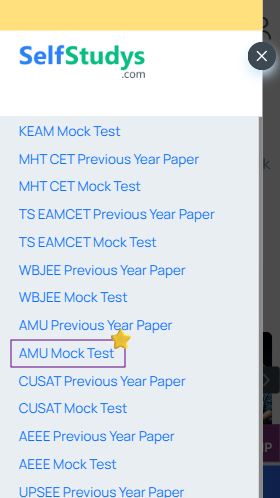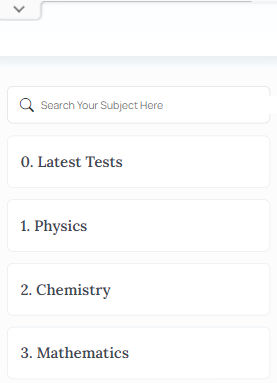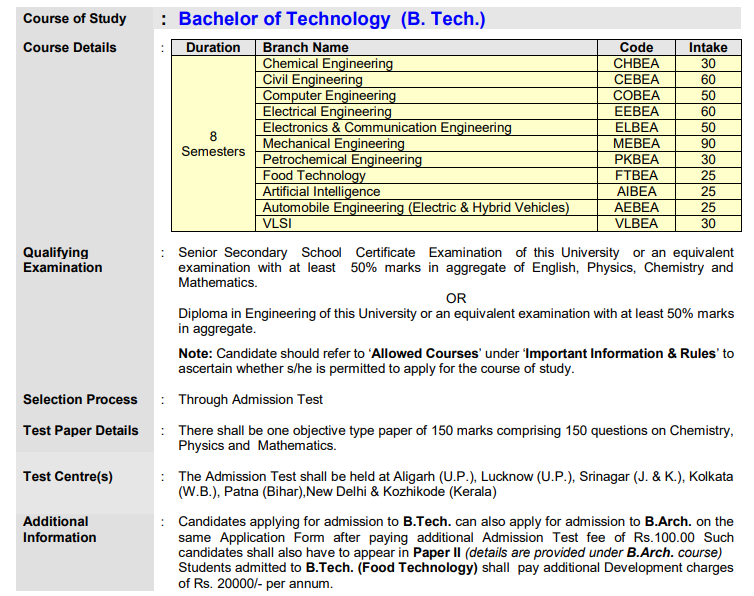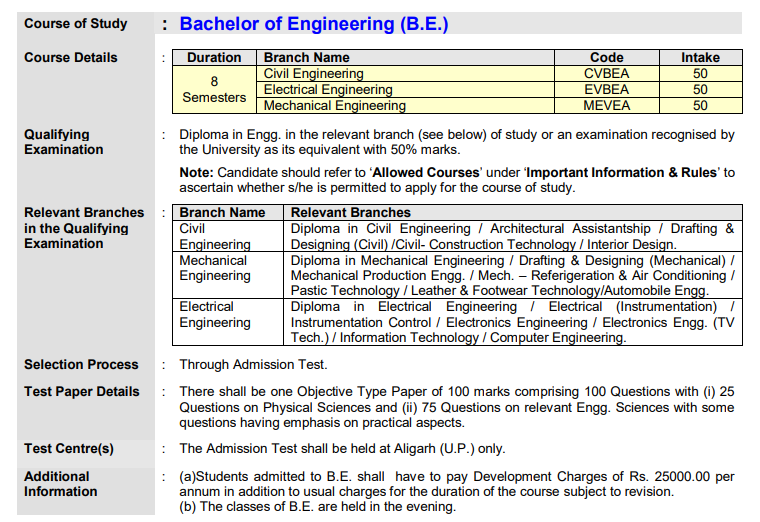The AMUEEE mock test provides you with a realistic experience of the exam environment. Our team of subject-matter experts also includes previous year’s questions in this test in order to reflect the current exam trends. The exposure to a wide range of questions prepares you to tackle various difficulty levels and question formats. An attempt at this mock test can significantly increase your scoring potential in the actual exam.
Highlights Of The Aligarh Muslim University Engineering Entrance Exam
The Aligarh Muslim University is situated in the state of Uttar Pradesh in India. A number of undergraduate courses are offered by this university for higher studies. The Bachelor of Technology (B.Tech) and Bachelor of Engineering are the most renowned fields for which the university conducts the AMUEEE. You can check out the detailed highlights of this examination in the table mentioned below.
|
PARTICULARS |
DETAILS |
|
Examination Name |
AMUEEE: Aligarh Muslim University Engineering Entrance Exam |
|
Frequency and Level of the Exam |
|
|
Examination Mode |
Offline- Pen and Paper-Based Test |
|
Duration of the Exam |
3 hours |
|
Number of Sections in the Question Paper |
Three
|
|
Total Number of Questions |
150 multiple-choice questions |
|
Marking Scheme |
|
|
Official Website |
|
|
Availability of AMU Mock Test Free |
AMUEEE Mock Test For Different Subjects
SelfStudys provides you with the AMUEEE free mock test for Physics, Chemistry, and Maths. All these subjects include a variety of mock test series so that you can prepare for every section of the exam effectively. You will be able to solve questions replicating the specific syllabus and difficulty level for each subject. This targeted practice can sharpen your understanding of crucial concepts with ease.
Solutions Included In The AMU Mock Test Free
The AMU mock test 2026 on our platform comes with solutions to the questions. These answers are carefully created by our subject-matter experts to provide clear and concise explanations for each question. It ensures that you can understand the underlying concepts that are required to arrive at the correct answers. You can go through these solutions once you have attempted and submitted the mock test on SelfStudys.
How To Attempt The AMUEEE Free Mock Test On SelfStudys?
The procedure to attempt the AMU online mock test for free on our digital platform can be completed by taking the steps mentioned below.
- Firstly, you need to head to the official page of our website. This can be done by opening your preferred search engine browser and typing www.selfstudys.com.

- A ‘Navigation’ bar will be displayed on the top-left corner of our homepage. You can start the process of accessing the AMU mock test series by clicking on this icon.
- Next, you have to click on the ‘JEE’ section from the vast list of study resources.

- This section will further open a drop-down menu wherein you need to scroll and select the ‘AMU mock test’ option.

- Within a few seconds, a new page will load on your screen, including all the subjects of this exam. Here, you can choose the subject for which you want to attempt the AMU online mock test free.

- Lastly, you can pick any AMUEEE mock test, click on its ‘Start Test’ button, read the given instructions, and begin solving the questions.
Note: Without Logging In or Signing Up on SelfStudys, it is not possible to attempt the AMU mock test free.
What Are The Important Topics Of AMU Mock Test 2026?
The subject-matter experts at SelfStudys strive to include all the important topics in our AMUEEE free mock test. In the table below, we have mentioned the chapters and topics of each subject that are frequently asked in the exam and are included in our mock tests.
|
AMU ONLINE MOCK TEST SYLLABUS |
|
|
Physics |
|
|
CHAPTER |
IMPORTANT TOPICS |
|
Physical World and Measurement |
Physics- scope and excitement, nature of physical laws; Physics, technology, and society. Dimensions of physical quantities, dimensional analysis, and its applications. |
|
Kinematics |
Frame of reference. Motion in a straight line: Position-time graph, speed, and velocity. Uniform and non-uniform motion, average speed, and instantaneous velocity. Uniformly accelerated motion, velocity-time, position-time graphs, and relations for uniformly accelerated motion (graphical treatment). |
|
Laws of Motion |
Intuitive concepts of force. Inertia, Newton’s first law of motion; momentum and Newton’s second law of motion; impulse; Newton’s third law of motion. Law of conservation of linear momentum and its applications. Equilibrium of concurrent forces. Static and kinetic friction, laws of friction, rolling friction. |
|
Work, Energy, and Power |
Scalar product of vectors. Work done by a constant force and a variable force; kinetic energy, work-energy theorem, power. The notion of potential energy, potential energy of a spring, conservative forces: conservation of mechanical energy (kinetic and potential energies); non-conservative forces: elastic and inelastic collisions in one and two dimensions. |
|
Motion of System of Particles and Rigid Body |
Centre of mass of a two-particle system, momentum conversation, and center of mass motion. Equilibrium of rigid bodies, rigid body rotation, and equations of rotational motion. Comparison of linear and rotational motions; moment of inertia, radius of gyration. |
|
Gravitation |
Kepler’s laws of planetary motion. The universal law of gravitation. Acceleration due to gravity and its variation with altitude and depth. Gravitational potential energy; gravitational potential. Escape velocity. Orbital velocity of a satellite. Geo-stationary satellites. |
|
Properties of Bulk Matter |
Elastic behavior, Stress-strain relationship, Hooke’s law, Young’s modulus, bulk modulus, shear, modulus of rigidity. Pressure due to a fluid column; Pascal’s law and its applications. Viscosity, Stokes’ law, terminal velocity, streamline, and turbulent flow. Bernoulli’s theorem and its applications. Heat, temperature, thermal expansion; change of state-latent heat. |
|
Thermodynamics |
Thermal equilibrium and definition of temperature (zeroth law of thermodynamics). Heat, work, and internal energy. The first law of thermodynamics. Isothermal & adiabatic process. The second law of thermodynamics: reversible and irreversible processes. Heat engines and refrigerators. |
|
Behavior of Perfect Gas and Kinetic Theory |
Equation of state of perfect gas, work done on compressing a gas. Kinetic theory of gases-assumptions, the concept of pressure. Kinetic Interpretation of temperature; Avogadro’s number. |
|
Oscillations and Waves |
Periodic motion-period, frequency, displacement as a function of time. Periodic functions. Simple harmonic motion (S.H.M) and its equation; oscillations of a spring restoring force and force constant; energy in S.H.M.-kinetic and potential energies. Wave motion. Longitudinal and transverse waves, speed of wave motion. Displacement relation for a progressive wave, fundamental mode and harmonics, Beats, Doppler effect. |
|
Electrostatics |
Electric charges, Conservation of charge, Coulomb’s low force between two-point charges forces between multiple charges. Electric field, electric field due to a point charge, electric field lines; electric dipole electric field due to a dipole torque on a dipole in a uniform electric field. Electric flux, statement of Gauss’s theorem. |
|
Current Electricity |
The electric current flow of electric chargers in a metallic conductor drift velocity, mobility, and their relation with electric current; Ohm’s Law electrical resistance. Carbon resistors color code for carbon resistors; temperature dependence of resistance. Internal resistance of a cell. Kirchhoff’s laws and simple applications. |
|
Magnetic Effects of Current and Magnetism |
Concept of the magnetic field, Oersted’s experiment. Biot-Savart law and its application to the current carrying circular loop. Ampere’s law and its applications to infinitely long straight wire, straight and toroidal solenoids. Force on a moving charge in uniform magnetic and electric fields. Cyclotron. |
|
Electromagnetic Induction and Alternating Currents |
Electromagnetic Induction; Faraday’s law. Induced emf and current; Lenz’s law, Eddy's current self, and mutual induction. Alternating currents, peak and rms value of alternating; current/voltage, reactance, and impedance; LC oscillations (qualitative treatment only). |
|
Atoms and Nuclei |
Alpha-particle scattering experiment, Rutherford’s model of atom; Bohr model, energy levels hydrogen spectrum. Composition and size of nucleus, Radioactivity – alpha, beta and gamma particles/rays and their properties; radioactive decay law Mass-energy relation; nuclear fission, nuclear fusion. |
|
Chemistry |
|
|
CHAPTER |
IMPORTANT TOPICS |
|
Some Basic Concepts of Chemistry |
General Introduction: Importance and scope of chemistry. Historical approach to particulate nature of matter, laws of chemical combination, Dalton’s atomic theory. |
|
Structure of Atom |
Discovery of the electron, proton, and neutron; Thompson’s model, Rutherford’s model, Bohr’s model, Broglie’s relationship, and Heisenberg's uncertainty principle. |
|
Chemical Bonding and Molecular Structure |
Valence electrons, ionic bond, covalent bond, bond parameters, Lewis structure, the polar character of covalent bond, VSEPR theory, the concept of hybridization involving s, p, and d orbitals and shapes of some simple molecules. |
|
Equilibrium |
Equilibrium in physical and chemical processes, dynamic nature of equilibrium, law of mass action, equilibrium constant, factors affecting equilibrium – Le Chatelier’s principle; ionic equilibrium – ionization of acids and bases, strong and weak electrolytes, degree of ionization, ionization of polybasic acids, acid strength, concept of pH, Hydrolysis of salts. |
|
Solid State |
Classification of solids based on different binding forces molecular, ionic covalent, and metallic solids, amorphous and crystalline solids, Band theory of metals, conductors, semiconductors, and insulators, and n and p-type semiconductors. |
|
Solutions |
Types of solutions, expression of concentration of solutions of solids in liquids, the solubility of gases in liquids, solid solutions, colligative properties – the relative lowering of vapor pressure, Raoult’s law, the elevation of B.P., depression of freezing point, osmotic pressure, determination of molecular masses using colligative properties, abnormal molecular mass, Vant Hoff factor. |
|
Electrochemistry |
Redox reactions; conductance in electrolytic solutions, specific and molar conductivity variations of conductivity with concentration, Kohlrausch’s Law. Relation between Gibbs energy change and EMF of a cell, fuel cells; corrosion. |
|
Surface Chemistry |
Adsorption – physisorption and chemisorption; factors affecting adsorption of gases on solids; catalysis homogenous and heterogeneous, activity and selectivity: enzyme catalysis; colloidal state: the distinction between true solutions, colloids, and suspensions. |
|
Maths |
|
|
CHAPTER |
IMPORTANT TOPICS |
|
Sets and Functions |
Sets and their representations. Empty set. Finite & Infinite sets. Equal sets. Subsets. Power set. Universal set. Venn diagrams. Orders pairs, Cartesian product of sets. Number of elements in the Cartesian product of two finite sets. Cartesian product of the reals with itself (up to R x R x R). Positive and negative angles. Measuring angles in radians and in degrees and conversion from one measure to another. Definition of trigonometric functions with the help of unit circle. |
|
Algebra |
Principle of Mathematical Induction; Complex Numbers and Quadratic Equations; Linear Inequalities; Permutations and Combinations; Binomial theorem; Sequence and Series; Matrices; Determinants. |
|
Coordinate Geometry |
Straight Lines, brief recall of 2 D from earlier classes. The slope of a line and the angle between two lines. Various forms of equations of a line. Conic Sections; Sections of a cone: circle, ellipse, parabola, hyperbola, a point, a straight line, and pair of intersecting lines as a degenerated case of conic section. Introduction to 3-D Geometry; Coordinate axes and coordinate planes in three dimensions. Coordinates of a point. Distance between two points and section formula. |
|
Calculus |
Limits and Derivatives; Continuity and Differentiability; Applications of Derivatives; Integrals; Applications of Integrals; Differential Equations. |
|
Mathematical Reasoning |
Mathematically acceptable statements. Connecting words/phrases – consolidating the understanding of “if and only if (necessary and sufficient) condition”, implies”, and/ or”, implied by, “and”, “or”, “there exists” and their use through a variety of examples related to real life and mathematics. |
|
Linear Programming |
Introduction, definition of related terminology such as constraints, objective function, optimization, different types of linear programming (LP) problems, mathematical formulation of LP, problems, graphical method of solution for problems in two variables, feasible and infeasible regions, feasible and infeasible solutions, optional feasible solutions. |
|
Probability |
Multiplication theorem on probability, Conditional probability, independent events, total probability, Baye’s theorem, Random Variable, and its probability distribution, mean and variance of a random variable. Repeated independent (Bernoulli) trials and Binomial distribution. |
Courses Offered Through Aligarh Muslim Univeristy Engineering Entrance Exam
Once you have passed the AMUEEE, you will be admitted into the Zakir Hussain College of Engineering and Technology. The engineering streams that are offered for various programs in this college are:
Bachelor of Technology (B.Tech)
- Chemical Engineering
- Civil Engineering
- Computer Engineering
- Electrical Engineering
- Electronics and Communication Engineering
- Mechanical Engineering
- Petrochemical Engineering
- Food Technology
- Artificial Intelligence
- Automobile Engineering (Electric Vehicle)
- V.L.S.I.
Bachelor of Engineering
- Civil Engineering
- Electrical Engineering
- Mechanical Engineering
Diploma in Engineering
- Civil Engineering
- Communication Engineering
- Computer Engineering
- Computer Science and Engineering
- Electrical Engineering
- Electronics Engineering
- Electronics and Communication Engineering
- Information Technology
- Electrical and Instrumentation Engineering
- Mechanical Engineering
- Architecture
- Interior Design
- Leather Goods and Footwear Technology
Important Details Regarding AMU Engineering Courses
With the help of the images displayed below, you can learn some important information related to the courses mentioned above.


How To Make The Most Of AMU Online Mock Test?
To achieve a high score in the Aligarh Muslim University Engineering Entrance Exam, you need to approach the AMU mock test 2026 in a strategic way. Some points on how to make the most of this mock test are described by our experts below.
Preparation Before The AMU Mock Test Series
- The first point is to ensure that you are familiar with the entire syllabus and exam pattern. Knowing what topics are generally covered will help you focus on the right areas during preparation.
- You must develop a structured study plan that allocates sufficient time to each subject and topic. You can incorporate regular AMU online mock tests into this plan to monitor your progress.
- You should make sure that you have access to quality AMU mock test series that mimic actual exam patterns and difficulty levels. You can rely on the SelfStudys platform to get the best practice materials.
- You need to define what you aim to achieve with each AMU online mock test free, like improving your time management, enhancing accuracy, or mastering specific topics.
During The AMU Online Mock Test Free Attempt
- You should try to take the AMU mock test under conditions similar to the actual exam. This includes sitting in a quiet place, following the time limit, and avoiding any interruptions.
- You must practice managing your time effectively. You may assign specific time slots for each section or question type, and try to avoid spending too much time on one question.
- You need to pay attention to the instructions before starting the AMUEEE mock test. By doing so, you can easily understand the marking scheme, question format, and any particular guidelines.
- You should make an effort to attempt all questions of the AMU mock test free. In case you are unsure of the answer, then make an educated guess rather than leaving the question blank.
After The Attempt Of AMU Mock Test
- You must thoroughly review the AMUEEE free mock test results. You can identify areas where you made mistakes or took too much time. Understanding your weak points is very crucial for improvement.
- You should go through the correct answers and explanations for each question of the AMU mock test 2026. It will help you understand the concepts better and learn from your mistakes.
- If you find certain questions or topics challenging, then you must seek help from teachers or peers to clarify your doubts.
- You should keep a record of your performance in each AMU online mock test. You can note the scores, areas of improvement, and time taken. It will help in tracking your progress over time and adjusting your study plan accordingly.
Absolutely, attempting a number of AMU online mock tests can reduce exam anxiety as it increases your familiarity with the exam format and builds confidence.
You can prepare for the AMU mock test 2026 by thoroughly studying the syllabus, revising key concepts, and practicing with previous test papers.







 Profile
Profile Signout
Signout










 Quiz
Quiz
 Get latest Exam Updates
Get latest Exam Updates 










